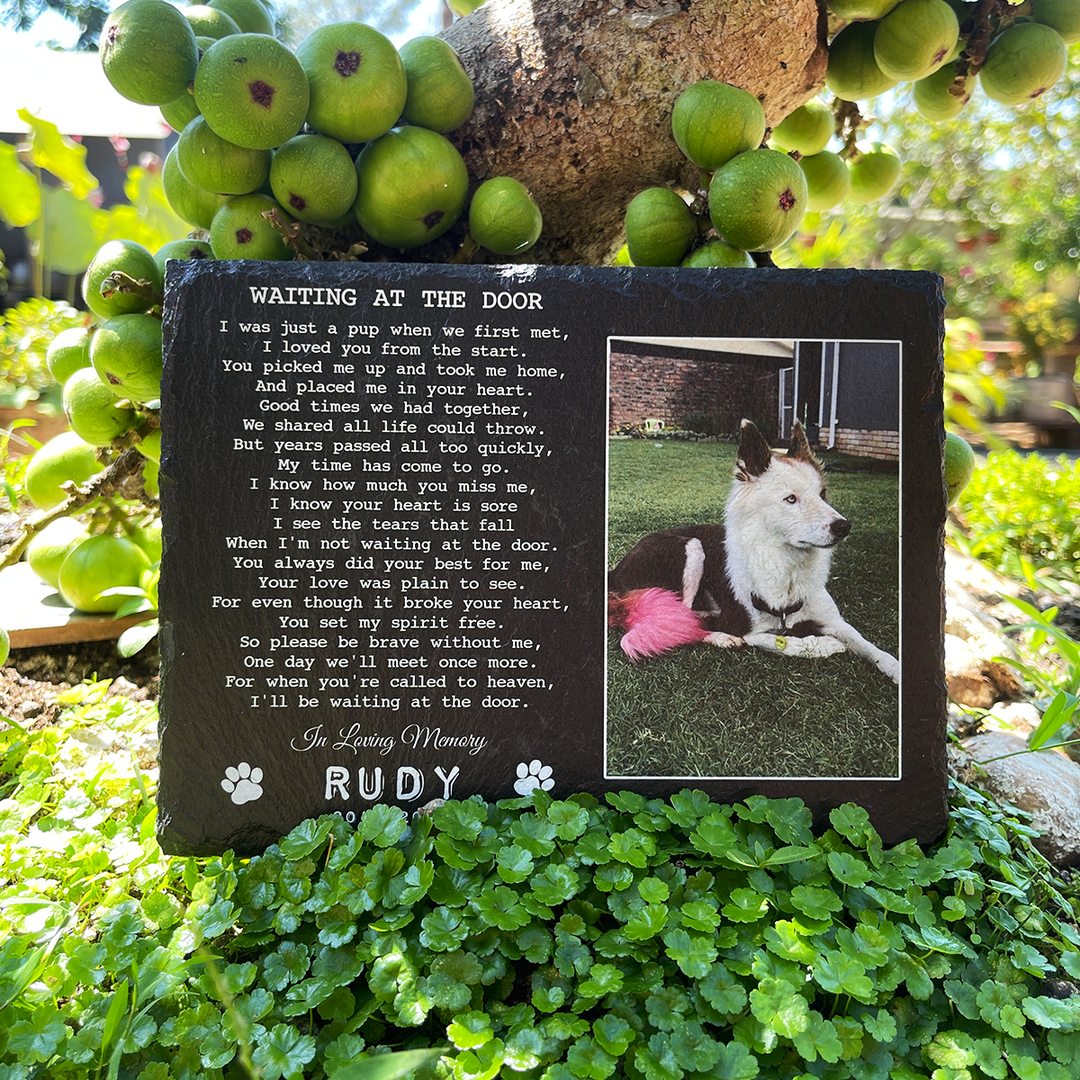Best Selling- Dog Memorial Stone
View allCoping with Grief: Breathing, Meditation and Journaling
Grief, a complex response to loss, strikes at our core, requiring effective strategies for coping with grief. It encompasses varied emotions, from sadness to anger, influencing thoughts, behaviors, and well-being. Successfully dealing with grief demands acknowledging the interconnected nature of our mental, emotional, and physical facets.
In this exploration, we present three techniques—breathing, meditation, and journaling—that synergize into a toolkit for navigating through grief. These methods form a supportive foundation for healing.
Addressing grief holistically is paramount when dealing with its impact. Loss affects every dimension of our existence. Embracing breathwork, meditation, and journaling nurtures each layer of our being, paving a path toward growth and renewal.
Throughout the sections, we delve into the significance of each technique, exploring how breathwork, meditation, and journaling offer pathways to healing and support journeying through grief. Embracing these practices collectively navigates grief, honoring our holistic essence.
The Power of Breathwork to Coping with Grief

Exploring the Link Between Emotions and Breathing Patterns
The intimate link between our emotional state and the way we breathe is a testament to the intricate dance between body and mind. When coping with grief, emotions often manifest in our breath—rapid and shallow when anxious, slow and heavy when sorrowful. Understanding and harnessing this connection provides a gateway to emotional regulation and healing.
Breathwork Exercises for Managing Grief
- Deep Diaphragmatic Breathing: This foundational technique involves breathing deeply into the diaphragm, engaging the whole lung capacity. Inhaling slowly through the nose, allowing the abdomen to rise, and exhaling gently through the mouth triggers a relaxation response. This practice not only calms the mind but also brings awareness to the present moment, an essential aspect of coping with grief.
- Box Breathing: A structured technique, box breathing guides inhaling for a count, holding for the identical count, exhaling for the count, and holding the breath out for the exact calculation. The rhythmic pattern engages the parasympathetic nervous system, fostering a sense of control over emotions while coping with grief.
- 4-7-8 Breath: Designed to induce a sense of tranquility, this technique involves inhaling for a count of four, holding for seven, and exhaling for eight. The extended exhale calms the nervous system, reducing stress and anxiety, crucial elements in coping with grief.
The Calming Effect of Breathwork on the Nervous System
Breathwork acts as a bridge between our conscious and subconscious selves. Deliberate, controlled breathing stimulates the parasympathetic nervous system, the body's "rest and digest" mode.
By engaging this system through breathwork, we counteract the physiological responses associated with grief, such as increased heart rate and shallow breathing. As we find solace in the rhythm of our breath, we forge a path toward emotional equilibrium, a critical component of coping with grief.
Meditation for Healing

Exploring Meditation's Role in Emotional Processing
Meditation, a timeless practice revered for its transformative power, emerges as a beacon of hope in the realm of coping with grief. At its core, meditation invites us to embrace our emotions as they arise, fostering a space of non-judgmental observation.
In the context of grief, this practice becomes a sanctuary where we can navigate the complexities of our feelings and, over time, find healing.
The Various Meditation Techniques Suited for Grief
- Mindfulness Meditation: Rooted in the art of being present, mindfulness meditation encourages us to anchor our attention to the current moment. As we acknowledge our grief without resistance, we cultivate a gentle awareness that allows emotions to flow without overwhelming us. Through this practice, we find respite during emotional turmoil while coping with grief.
- Loving-Kindness Meditation: Also known as Metta meditation, this technique extends compassion not only to ourselves but also to others who are suffering. By radiating feelings of love, understanding, and empathy, we break down the walls of isolation that grief can erect. This practice supports a sense of connection and shared humanity, pivotal aspects of dealing with grief.
- Body Scan Meditation: In coping with grief, we often hold emotions within our bodies. The body scan meditation methodically directs our attention to different parts of the body, allowing us to identify areas of tension or discomfort. As we breathe into these areas, we release pent-up emotions, fostering a physical and emotional release that supports our healing journey.
Illuminating Meditation's Role in Self-Awareness and Acceptance
Meditation, at its heart, is an exploration of the self. It invites us to witness our thoughts, feelings, and sensations without judgment. As we consistently engage in meditation practices, we cultivate an intimate relationship with our inner landscape, heightening self-awareness.
This newfound awareness brings to light the intricate tapestry of emotions that comprise grief. By observing without attaching, we foster an environment of acceptance, allowing us to gradually embrace the ebb and flow of emotions inherent in coping with grief.
Journaling as a Therapeutic Outlet

The Therapeutic Benefits of Journaling for Grief
In the realm of coping with grief, journaling emerges as a poignant ally. This practice provides a haven where our thoughts and emotions can flow freely, unburdening our hearts and minds.
The act of putting pen to paper creates a tangible outlet for intangible pain, offering a space where we can process, explore, and eventually heal.
Guiding Prompts for Effective Grief Journaling
- Reflecting on Memories: We honor the moments we spent with our loved ones by embarking on a trip down memory lane. We bridge the chasm between the past and the present by reflecting on treasured memories and finding comfort in the lovely moments that characterize our relationships.
- Expressing Emotions Freely: In the pages of a journal, we have the freedom to unleash our emotions without restraint. Whether it's anger, sadness, or longing, allowing these feelings to flow onto paper provides release and validation, essential components of coping with grief.
- Setting Intentions for Healing: Through intention-setting, we channel our pain into a proactive force for transformation. Journaling empowers us to outline our healing journey, pinpointing actionable steps that lead us toward acceptance and renewal.
Journaling's Role in Tracking Progress and Insights
Journaling is a compass that guides us through the terrain of coping with grief. As we document our thoughts and feelings over time, we bear witness to our evolution.
Patterns emerge, revealing subtle shifts and progress that might otherwise go unnoticed. Journaling invites us to be both the narrator and the protagonist in our healing story, empowering us to extract insights from our experiences and weave a narrative of growth.
In essence, journaling becomes a sacred dialogue between ourselves and our grief. As we pour our hearts onto the pages, we construct a narrative that captures the essence of our emotions, thoughts, and aspirations. Through this act of self-expression, we find a path toward understanding, acceptance, and ultimately, healing.
Creating a Holistic Grief Coping Routine

The Synergy Between Breathwork, Meditation, and Journaling
Breathwork, meditation, and journaling are three strategies that work well together in the complex tapestry of grieving. To create a comprehensive strategy that addresses the emotional, mental, and physical aspects of our grieving journey, each activity enhances the others. Through the peaks and valleys of our existence, their combined impacts provide a framework of support for us.
Sample Daily Routine Incorporating All Three Techniques
- Morning: Begin your day with deep diaphragmatic breathing, inhaling serenity and exhaling tension. Transition into mindfulness meditation, anchoring yourself in the present. As you breathe, let emotions rise and fall, without judgment. Conclude by journaling—penning gratitude for the day ahead and setting intentions for emotional well-being.
- Midday: Take a breather with a quick round of box breathing. Center yourself amidst the busyness of the day. During a break, engage in a body scan meditation, observing any emotional knots. Capture your thoughts and sensations in your journal, allowing them to unfold on the pages.
- Evening: As night falls, indulge in loving-kindness meditation, extending compassion to yourself and others coping with grief. Follow with 4-7-8 breaths, soothing the nervous system. Conclude the day by journaling reflections—acknowledging your journey, embracing the emotions felt, and nurturing gratitude for progress.
Encouraging Adaptability and Customization
The beauty of this holistic routine lies in its adaptability. Each person's journey through grief is unique; what resonates with one may not resonate with another. Tailor this routine to your needs, adjusting the timings and practices as required.
Feel free to lean into the technique that provides solace on any given day. Remember, coping with grief is a fluid process, and this routine serves as a compass, not a strict regimen.
In stitching breathwork, meditation, and journaling together, you are weaving a resilient tapestry of support to traverse your grief landscape. Adapt, customize, and find the rhythm that resonates with you as you journey toward healing.
Overcoming Challenges and Resisting Stagnation
Acknowledging Potential Obstacles in Maintaining the Routine
Embarking on a journey of dealing with grief through breathwork, meditation, and journaling is a profound endeavor, yet it's not without its challenges. Life's demands, emotional fluctuations, and moments of overwhelm can pose obstacles to maintaining your routine. Recognizing these hurdles is the first step in overcoming them.
Tips to Overcome Resistance and Stay Consistent
- Start Small: Begin with bite-sized sessions. Five minutes of breathwork, a brief meditation, or a few lines in your journal can be stepping stones to consistency.
- Incorporate Rituals: Integrate your practices into daily rituals. Engage in breathwork before breakfast, meditate during your lunch break, and journal before bed. Rituals create anchors that support routine adherence.
- Adjust with Compassion: Some days, grief might feel heavier. Allow yourself to modify the practices to suit your emotional state. The key lies in showing up, even amid difficulty.
- Accountability: Share your intentions with a friend or family member. Knowing you're accountable to someone else can provide the nudge needed to maintain your routine.
Stressing the Importance of Seeking Professional Help
While breathwork, meditation, and journaling are potent tools, they might not be sufficient for everyone. Grief's complexities can benefit from the guidance of a mental health professional.
If your grief becomes overwhelming, seeking professional assistance is a sign of strength, not weakness. A skilled therapist can navigate the intricacies of your emotions and offer tailored strategies for coping with grief.
Navigating the challenges, staying consistent, and knowing when to seek professional help are all integral aspects of the journey. By addressing obstacles head-on and acknowledging your own limits, you pave a path toward a resilient and adaptive approach to coping with grief.
Resources for Further Support
Books, Apps, and Online Resources
Books:
- "The Healing Power of Breath" by Dr. Richard Brown and Dr. Patricia Gerbarg
- "The Miracle of Mindfulness" by Thich Nhat Hanh
- "The Artist's Way" by Julia Cameron (for journaling)
Apps:
- Calm: Offers guided meditation sessions and breathwork exercises.
- Headspace: Provides a variety of meditation practices tailored to different needs.
- Day One: A digital journaling app to capture your thoughts and emotions.
Online Resources:
- Insight Timer: A platform hosting a wide range of free guided meditations.
- Breathing Techniques for Stress Relief: Online tutorials for various breathwork exercises.
- Journaling Prompts for Grief: Websites with curated prompts to aid in emotional processing.
Helpline Numbers and Mental Health Resources
- National Suicide Prevention Lifeline: Call 1-800-273-TALK (1-800-273-8255) for immediate help if you or someone you know is in crisis.
- Crisis Text Line: Text "HELLO" to 741741 to connect with a trained crisis counselor via text message.
- Mental Health America: Provides an array of resources for mental health support and advocacy.
- Therapist Directories: Websites like Psychology Today and BetterHelp can help you find licensed therapists in your area or for online sessions.
- Grief Support Groups: Look for local or online grief support groups through organizations like GriefShare or The Compassionate Friends.
These resources extend a helping hand in your journey of coping with grief. Whether you seek further education, guided practices, or immediate assistance, these tools are designed to support and empower you as you navigate the complexities of grief and healing.
Final Thoughts
In the journey of coping with grief, we've delved into the transformative potential of breathwork, meditation, and journaling. These practices offer solace and healing, helping us find acceptance and renewal amid loss.
Integrating breathwork, meditation, and journaling forms a comprehensive framework for dealing with grief. Together, they weave a tapestry of support that addresses the many facets of our emotions, enabling us to navigate grief with resilience.
Remember that you're not alone on this journey. With breathwork to ground you, meditation to embrace emotions, and journaling to give voice to thoughts, you embark on a healing path. These tools empower you to navigate grief's complexities, nurturing holistic well-being and guiding you toward renewal. As you move forward, these practices illuminate a path to healing, growth, and a renewed sense of self.














Leave a comment